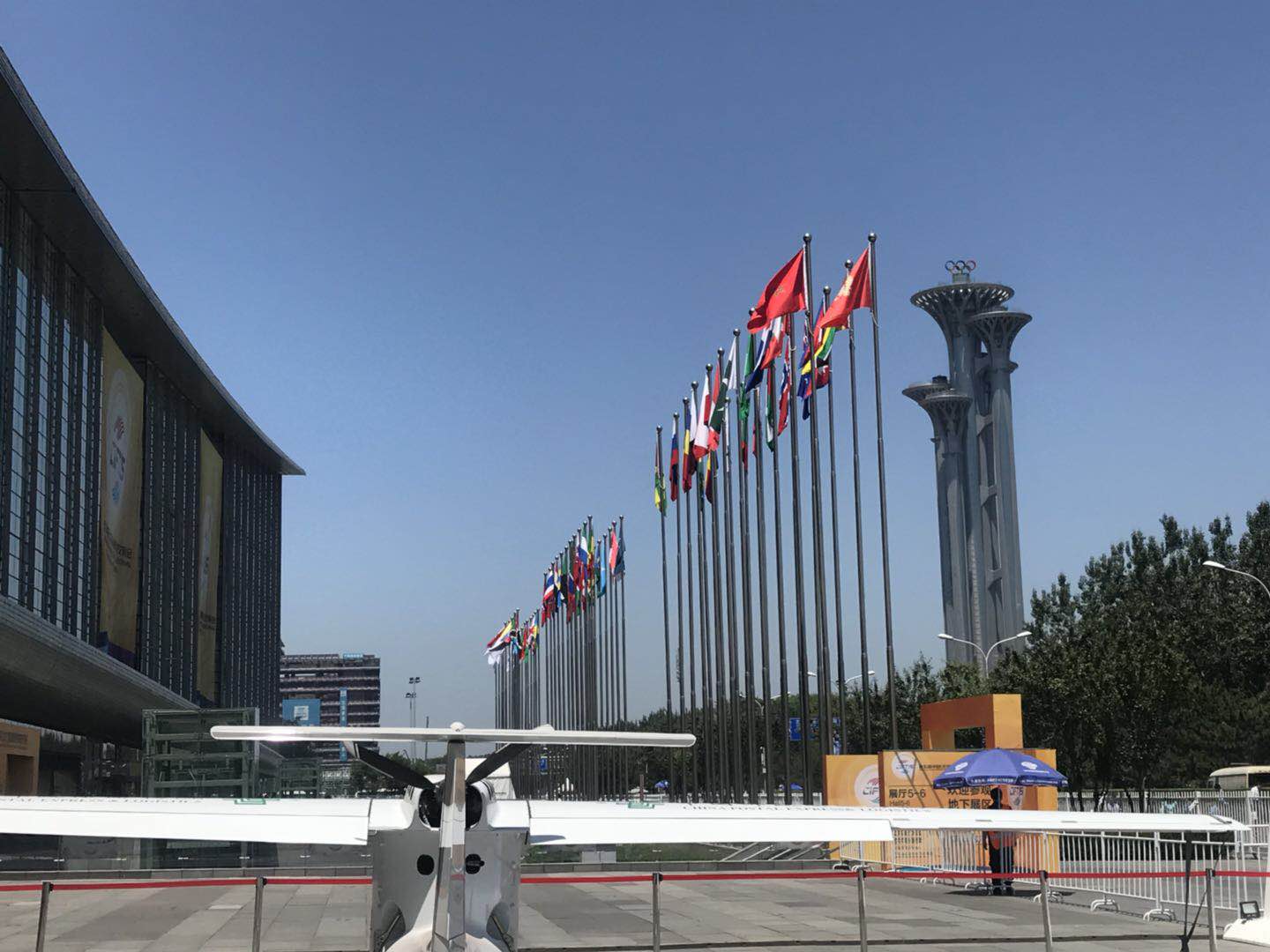
By Qian Ding, CCTV.com reporter
The last day of May ended with nice weather in Beijing. When I got off the subway station "Olympic Park", one of Beijing's landmarks, Olympic Park Watchtower, came to view. The 258 meters high tower, with four smaller circular floors at different positions below a large top floor, is meant to echo the Olympic rings. The Chinese take tremendous pride in the 2008 Beijing Olympic games. Nonetheless, despite the best efforts of Beijing to control emissions in the run-up to the games, the air quality was still not satisfying at the time, which had triple the level of soot as Atlanta, U.S.A and 3.5 times higher than Sydney, Australia.
Ten years later, I came to the same area where the 2008 Olympic Games were held, not for another game, but for the 8th International Green Economy Prosperity Forum (IGEPF), organized by International Green Economy Association, held at the Beijing National Convention Center from May 31 to June 1. Experts and enterprises from more than 10 countries including China, Germany, Sweden, Portugal, Hungary had arrived to promote global cooperation of the green economy. The theme for this year's forum is "Green Economy- High Quality Growth and the Belt and Road Initiative," three key words in China's recent development process.
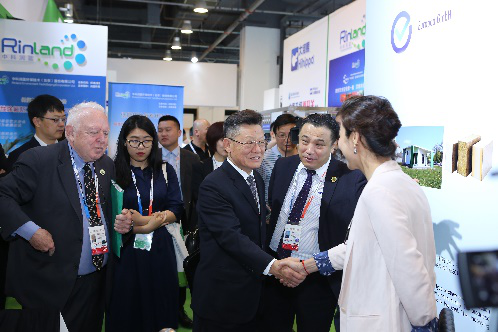
Sha Zukang, Chairman of IGEPF 2018 and Former Under-Secretary-General of the UN talking with entrepreneurs at 2018 International Green Life Exhibition. (Photo/ Qian Ding)
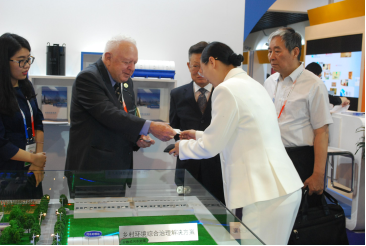
Frederick C.Dubee, Senior Adviser to United Nations Global Compact, at 2018 International Green Life Exhibition. (Photo/ Qian Ding)
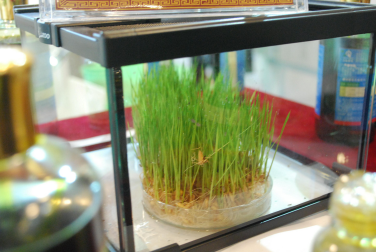
Environmental friendly pesticide displayed at 2018 International Green Life Exhibition. (Photo/ Qian Ding)
At the opening ceremony, guests had expressed their opinions on green development. Sha Zukang said, "Actions speaks louder than words, the policies need to be implemented to be effectual." "Green cooperation under the Belt and Road Initiative is another focus of this forum. Belt and Road Initiative is not to relocate backward production capacity with high pollution and energy consumption to other countries, but to integrate China's green development concept and high-quality industries into the cooperation of all countries."
Liu Yanhua, Consultant of State Council, emphasized the importance of sharing economy. He compared the difference between "Made in China 2025" and German "Industry 4.0" strategy. He said, "we found that the difference is that China still focus on the production of certain products, but German's focus is to promote the sharing platform for nine main technologies. After the platform is constructed, the research teams, companies and market can all be integrated on the platform for the research development. Germany is a post-industrialized country, while China is still in the middle of the second industrial revolution. It's understandable that China is still in industry 2025 times. However, developed countries have started to make progress in sharing economy, China must keep up with tightly, otherwise it would be far left behind."
Frederick C.Dubee, Senior Adviser to the United Nations Global Compact, presented the climate change risk China faces. He said Beijing, Tianjin, Shanghai, Guangzhou which are some of China's first-tire cities are all facing great risk if global temperatures keep rising. Many populated cities including New York, London, Bombay, Tokyo, Jakarta, Hong Kong and Shanghai are in danger if sea levels go up.
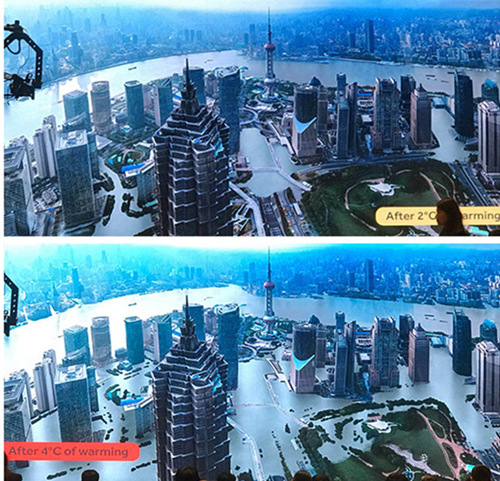
Prognostic photos of Shanghai when global temperature raise 2 degree Celsius and 4 degree Celsius. (Photo/ Qian Ding)
He said China is playing a leading role in global environment protections. The risk rate has already reached 66%, the actions must go on not just for today, but for the future.
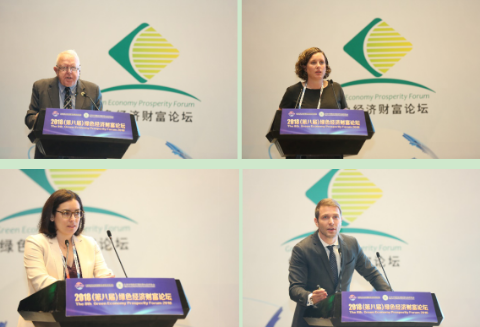
Frederick C.Dubee (upper left), Lotta LiIjelund (upper right), Patricia Conceicao (bottom left) and Peter Deak (bottom right) expressed their perspectives at the forum. (Photo/ IGEPF)
Economic Counselor of Swedish embassy in China, Lotta LiIjelund; Commercial Investment Counselor of Portuguese embassy in China, Patricia Conceicao and Director of the commercial office of the Hungarian embassy in China were all in attendance and said they were looking forward to more green cooperation with China.
Chinese President Xi Jinping has called for more to be done to promote ecological civilization in China. Beijing introduced measures to fight against air, soil, water and other pollution including rolling out its harshest environmental protection laws. Ecological progress promoted by local government will be reviewed annually, then again every five years, and be used as a criterion for promoting officials. Recently, 65 officials have been punished for failing to meet air pollution control requirements in northeast China's Heilongjiang Province, according to the Ministry of Ecology and Environment.
Tackling pollution is one of the "three tough battles" that China aims to win in the next three years, alongside reducing financial risk and eliminating poverty. Green development is a necessity for China. In Beijing, new coal-fired plants are prohibited, existing coal plants were replaced with natural gas, despite of costly process. But with much determination, China's economy can become greener in the future.
(The opinions expressed here do not necessarily reflect the opinions of Panview or CCTV.com. )

Panview offers a new window of understanding the world as well as China through the views, opinions, and analysis of experts. We also welcome outside submissions, so feel free to send in your own editorials to "globalopinion@vip.cntv.cn" for consideration.
















